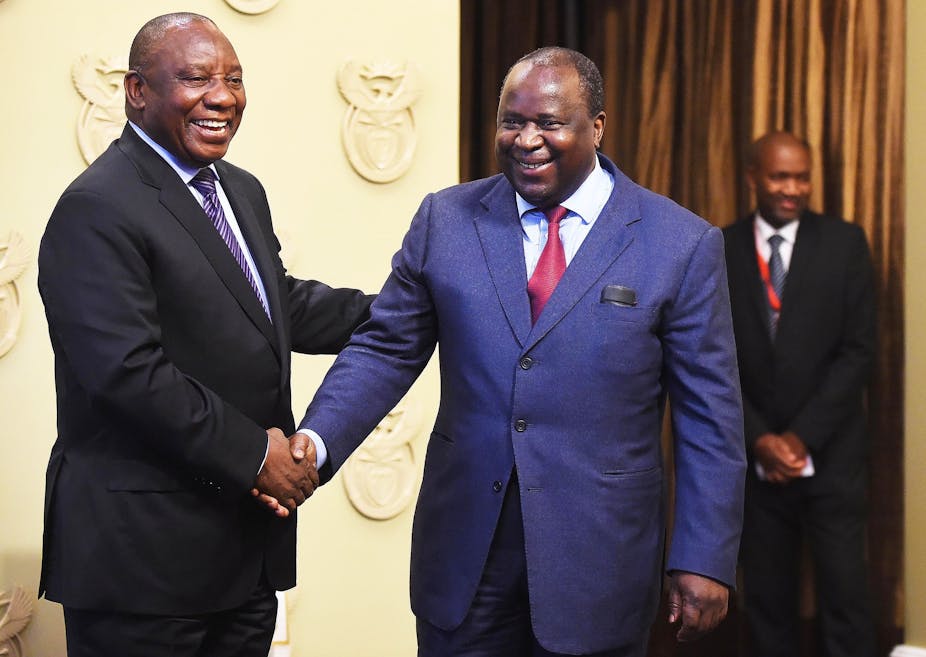
The latest reshuffling of South Africa’s finance minister, following the resignation of Nhlanhla Nene and appointment of Tito Mboweni, may have negative origins but it brings with it some positive energy.
Nene resigned as finance minister after it emerged that he lied about the nature of his contact with the controversial Gupta family, the friends of former President Jacob Zuma who stand accused of championing massive misappropriation of public funds in a process branded as state capture.
In an initial response to a journalist’s question, Nene claimed that he had only met the Guptas in passing. But in his recent testimony to a commission investigating state capture he admitted that he’d met Gupta family members on numerous occasions, including a number of visits to their house and their offices.
The inconsistency tarnished his integrity and sparked massive public criticism. Within a week of making his admissions he resigned. South Africa’s President Cyril Ramaphosa immediately appointed former South African Reserve Bank governor Mboweni as the new finance minister.
On the one hand Nene’s departure must be hailed as setting a new tone for South African politicians, particularly for the cabinet. By falling on his sword, he has taken responsibility for his actions – a rarity in South African politics. It’s tempting to cast his action in stone as the “Nene Rule” that sets a standard for politicians to resign when in the wrong.
On the other hand the appointment of Mboweni brings back someone with considerable skills and the political finesse needed to steer South Africa out of its current economic quagmire.
Mboweni needs to hit the ground running. In late October he must present the country’s medium term budget policy framework. All eyes will be on how he steers the challenge of rebalancing the national budget. His political skills and ranking might come in handy.
Equal to the task
Mboweni takes over the finance portfolio at a difficult time. Tough decisions will be required in a hostile environment as a strong populist wave sweeps through the ruling party, the African National Congress (ANC).
It’s therefore a positive that he commands a more senior political ranking than Nene had within the ANC. Mboweni claimed the 11th position in the tallying of the votes for the ANC’s National Executive Committee (NEC) during the ruling party’s 2017 elective conference that made Ramaphosa the President. The NEC is made up of 80 members and is the ANC’s highest decision making body between conferences.
In addition to this, Mboweni has a strong financial background. He served as governor of the South African Reserve Bank from 1999 to 2009. Prior that he served in Nelson Mandela’s first cabinet as minister of labour.
Both experiences should help equip him to meet the economic challenges facing the country. There’s no doubt that he’s knowledgeable about financial matters and is respected among investors.
His tenure at the Reserve Bank should ensure a smooth working relationship between the minister of finance, the national treasury and the central bank. As a previous governor, Mboweni understands this important relationship while valuing the autonomy and the independence of the various institutions and their responsibilities.
High expectations of Mboweni
Mboweni will need to be a quick study. He has only two weeks in which to familiarise himself with the details of the medium term budget.
He can’t afford to disappoint. This year’s budget will be watched more intensely than usual by key stakeholders, including investors and credit rating agencies because it follows closely on an economic stimulus and recovery plan announced by Ramaphosa. Details are expected to be unveiled in the medium term budget.
The medium term budget is also expected to signal how South Africa is dealing with its fiscal challenges. This is where government faces its very hard choices.
The ultimate aim must be to increase economic growth and eradicate unemployment. But to achieve these objectives the government must revise its expenditure priorities.
Expenditure on civil service remuneration, social grants and interest on government debt currently equates to 70% of the government’s tax revenue. This is clearly untenable. If not addressed, South Africa will face a fiscal cliff – the point at which these three expenditure items account for all government revenue and make spending on anything virtually impossible.
At the same time, Mboweni will have to work closely with Pravin Gordhan, the Minister of Public Enterprises, on the restructuring of state-owned enterprises. The precarious financial position of a number of state-owned enterprises is placing a heavy burden on taxpayers. Removing this burden will release resources that can be used to stimulate the domestic economy. Mboweni must therefore help with tough decisions about unaffordable vanity projects.
And, finally, Mboweni must sort out the challenges facing the Public Investment Corporation which is responsible for managing civil servants’ pension funds and is worth over R1,5 trillion.
Restoring trust
South Africa is in serious economic difficulty. It also faces a trust deficit owing to the state capture project of the Zuma administration. The golden triangle of trust between the government, the public and the business community has been broken. No country can succeed without this. Mboweni can play an important role in restoring it.![]()
Jannie Rossouw, Head of School of Economic & Business Sciences, University of the Witwatersrand
This article is republished from The Conversation under a Creative Commons license. Read the original article.

